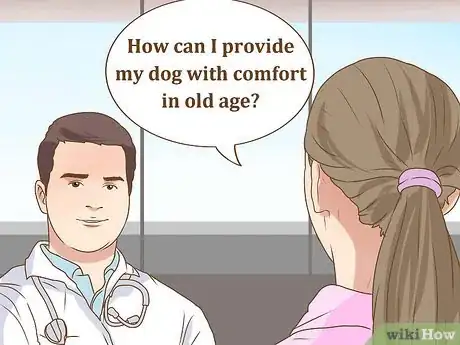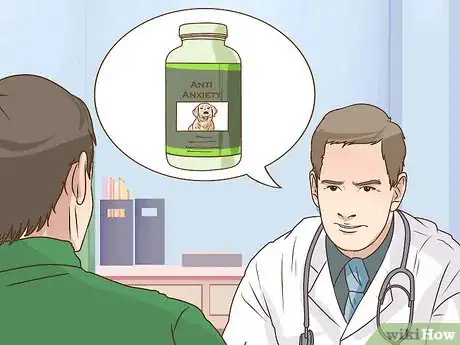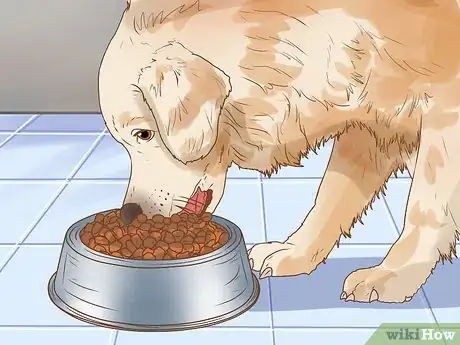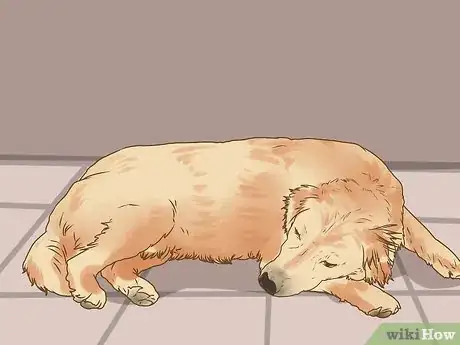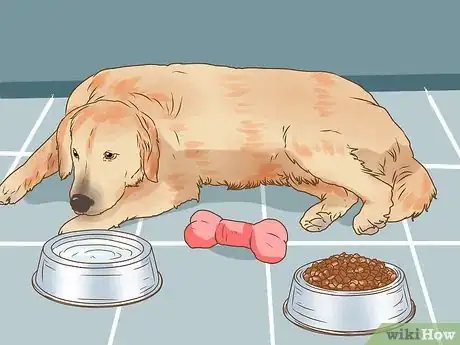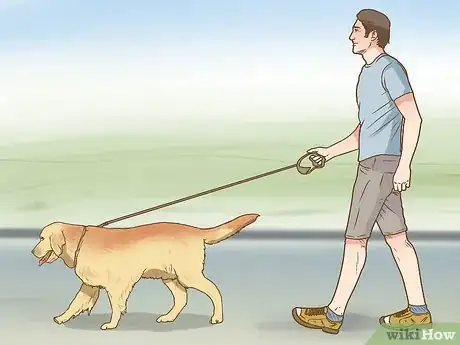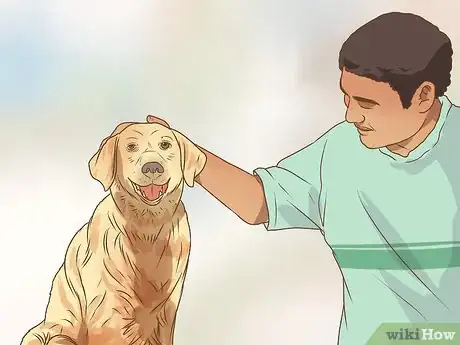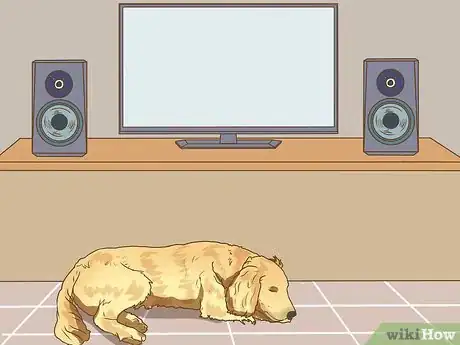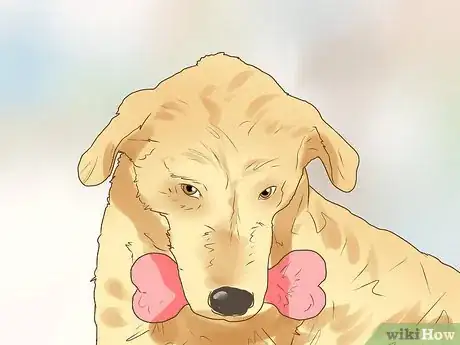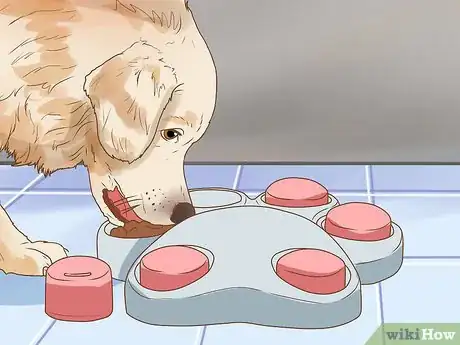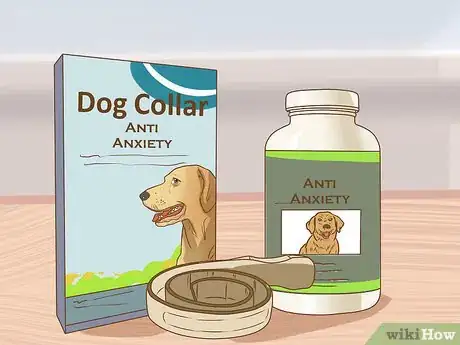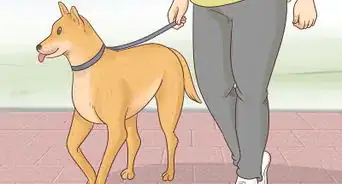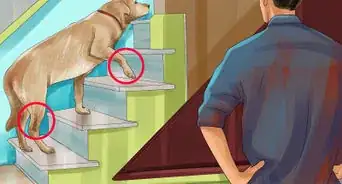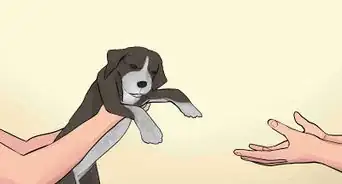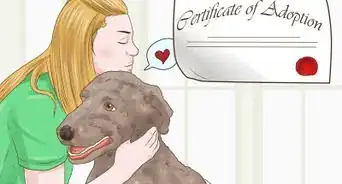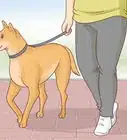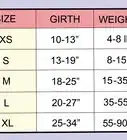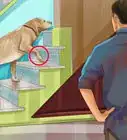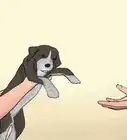This article was co-authored by Melissa Nelson, DVM, PhD. Dr. Nelson is a Veterinarian who specializes in Companion and Large Animal Medicine in Minnesota, where she has over 18 years of experience as a veterinarian in a rural clinic. She received her Doctor of Veterinary Medicine from the University of Minnesota in 1998.
wikiHow marks an article as reader-approved once it receives enough positive feedback. In this case, 96% of readers who voted found the article helpful, earning it our reader-approved status.
This article has been viewed 46,441 times.
As dogs age they may begin to develop new behavioural traits. For example, your older dog may become more clingy and develop separation anxiety. This could be a result of an underlying medical issue, such as acute pain, or loss of vision and hearing. Alternately, it could be associated with dementia and cognitive functioning. In order to deal with clinginess in older dogs, you should immediately talk with your veterinarian to find the reason behind the change in behaviour. You can also help to comfort your anxious dog by providing them with a stable environment and treating their separation anxiety.
Steps
Providing Medical Treatment for Age-Related Clinginess
-
1Talk with your veterinarian. If your dog begins to change their behaviour, then you should take them to the veterinarian. Do not assume that your dog’s new clinginess is simply related to aging. Instead, you should talk with your veterinarian to see if this behavioural change is a symptom of a larger medical problem. For example, your dog may be in pain and find comfort in your presence. Pain relieving medication may help alleviate this symptom. [1]
- Your vet may be able to prescribe medicine to help comfort your dog.
- Alternatively, the change in behaviour may not be treatable and is just a sign of aging.
- Ask your vet "How can I provide my dog with comfort in old age?" or "Should I pay more attention to my dog since it is being clingy?"
- Some anti-anxiety medications can cause the urine to turn pink, dizziness, dry eyes and mouth, lethargy, loss of appetite, nausea.[2]
- If any of these symptoms occur take your dog to the vet.
-
2Try anti-anxiety medication. If your dog is suffering from extreme separation anxiety, you may want to talk with your vet about anti-anxiety medication. Anti-anxiety medication can reduce the level of anxiety in your dog and may help to decrease any destructive behaviour that happens as a result of the anxiety.[3]
- For example, your dog may act out and eat something or go to the washroom in the house when you are out.
Advertisement -
3Change their diet. Your dog may be clinging to you because they are uncomfortable. Once you have talked with your vet about their change in behaviour they may tell you to change your dog’s diet. There are a variety of specialty foods that can help dogs with different medical conditions.. For example, you can get special food for dogs suffering from kidney failure or other medical issues.
- Talk with your vet to see if a change in diet would help alleviate your dog’s symptoms.
Creating a Comfortable Environment for Aging Dogs
-
1Create a stable routine. Older dogs like things to stay the same. They are often set in their ways, and find comfort in routine. For instance, try to keep their feeding schedule, exercise routine, and sleeping environment the same. This will allow them to have a stable and comfortable environment as they age. If their environment remains a source of comfort than they may not become as clingy.
- For example, if they normally sleep in your room, do not move them to a different place because they have started waking up in the middle of the night. They are likely just anxious and need comforting. Moving them to a new place may cause more anxiety and clinginess.
-
2Keep their environment the same. Some dogs will become more clingy in their old age because they are losing their senses. For example, they may find it much harder to see and hear as they age. As a result, they want to be close to you so that they feel safe and comforted. If you notice signs of vision loss (bumping into walls and furniture), or hearing loss (lack of response when you call them), you should try the following tips:
- Do not move furniture. You may feel that moving around furniture and opening up the house will make it easier for your dog to navigate.
- It is especially important to keep their bed, food and water bowls, and toys in the same place.
- Scent the rooms in your house differently, so that they determine where they are based on the smell.
-
3Walk your dog daily. Another way to keep your dog comfortable as they age is to continue providing them with daily exercise. You may feel that you should stop walking them because they are getting older, but it is actually important to continue their exercise routine. This can actually help them to delay some of the signs of aging. If your dog has become more clingy they will also enjoying engaging in activities with you.[4]
- Do not strain your older dog by taking them on a long and strenuous walk. Instead, take them for a short walk up the street to stimulate them and give them a mild form of exercise.
- If they have mobility issues, then you can engage in gentle play at home.
-
4Give your dog attention. If your dog is feeling disoriented as a result of vision or hearing loss and aging, you should provide them with some added attention and comfort. What may appear to be additional clinginess, could actually just be your dog trying to locate you in the house. For example, if your older dog is struggling with vision and hearing they may want to stay close to you so that they do not get lost and feel alone or abandoned.
- Provide your dog with gentle contact so that they know you are close.
- If you see that your dog is disoriented, you should slowly approach them and then touch them so that they can reorient themselves to you.
Treating Separation Anxiety in Older Dogs
-
1Provide your dog with sounds and light while you are away. As your dog ages they may become more anxious when you are not around. In order to treat their separation anxiety you can create a comforting environment for your dog while you are away from the house. Try making your house seem less empty while you are away by leaving lights on and providing your dog with comforting sounds.
- For example, leave the television on, or music playing, to provide the dog with some background noise. This can make the dog feel like they are not alone.
- Search online to find shows or sound tracks that are specifically created for dogs.
-
2Give your dog a comforting toy. Another way to make your dog feel comfortable while you are away, is to give them a comforting toy. For example, they may have a favourite plush toy that they carry around. Make sure that it is easily accessible while you are out of the house.
- Alternately, you could leave your older dog an article of your clothing. This way they will have your scent near by and it may help them feel comfortable while they are alone.
-
3Distract your dog with a treat. If your aging dog is suffering from separation anxiety when you leave the house, try giving it a treat to preoccupy the dog when you leave. Puzzle-type toys filled with treats are the best because they require your dog to work in order to access the treat.[5]
- For example, fill a KONG with peanut butter. This could take the dog 20-30 minutes to consume and will distract them as you leave.
-
4Try anti-anxiety products. You could also try using anti-anxiety products in order to alleviate separation anxiety among older dogs. For instance, you can purchase collars and sprays made with natural dog pheromones that can help your dog to relax. If your dog is suffering from anxiety this may help to create a calming environment.
- It takes about 24-28 hours for the effects to work, so it may be something at is used on an ongoing basis in your home.
Warnings
- If your dog shows any sign of change in behaviour or loss of appetite, you should take them to the veterinarian immediately.⧼thumbs_response⧽
References
- ↑ http://www.aspca.org/pet-care/dog-care/common-dog-behavior-issues/behavior-problems-older-dogs
- ↑ https://www.vetinfo.com/dog-anxiety-medication.html
- ↑ http://www.aspca.org/pet-care/dog-care/common-dog-behavior-issues/separation-anxiety
- ↑ http://www.mnn.com/family/pets/stories/7-things-your-senior-dog-would-like-to-tell-you
- ↑ http://www.aspca.org/pet-care/dog-care/common-dog-behavior-issues/separation-anxiety
About This Article
To deal with clinginess in your older dog,continue taking it for daily walks, even though it's getting older, since they can help reduce anxiety and boredom that leads to clinginess. Many older dogs become clingy because they start to lose their senses, so make sure to keep furniture and your dog’s bed and feeding bowls in the same places to reduce its anxiety. Additionally, try to keep a regular schedule for feeding and walking your dog, as this helps reduce any discomfort that might be causing its clinginess. You can also ask your vet about anti-anxiety medication for your dog if its separation anxiety is causing you problems. For more tips from our Veterinary co-author, including how to alleviate your dog’s anxiety when you’re not home, read on!
